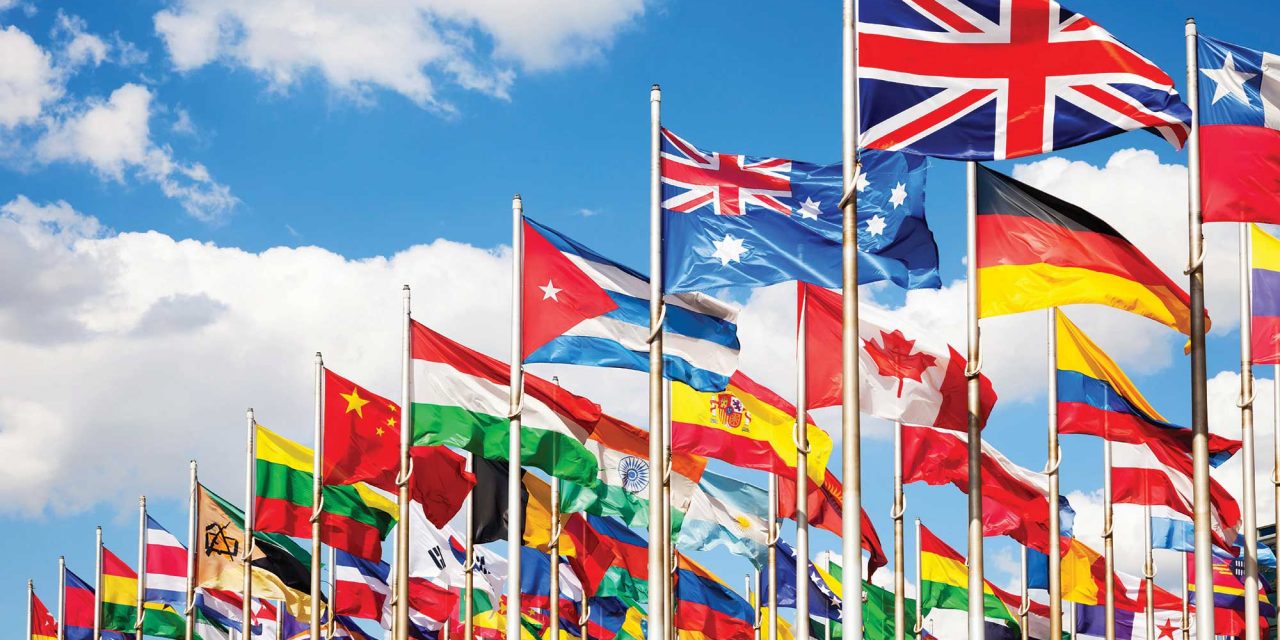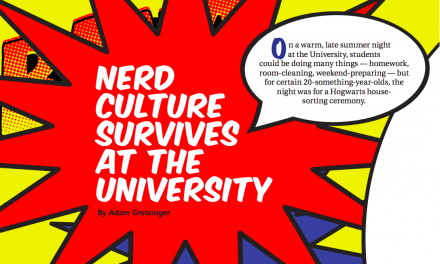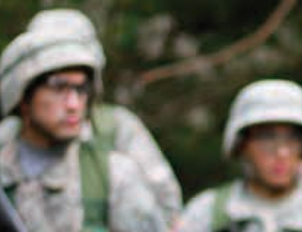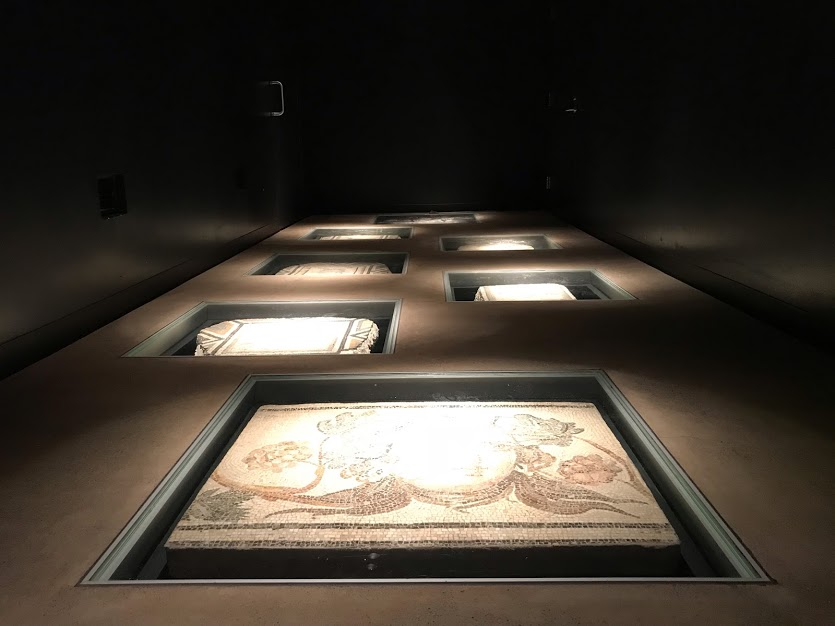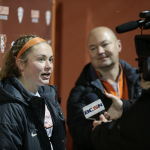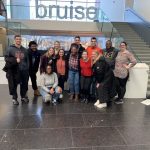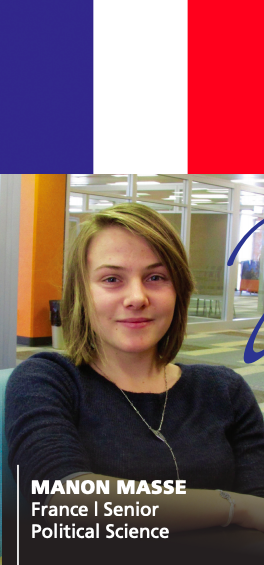
Manon
INTERNATIONAL STUDENT PERSPECTIVE
By Hannah Finnerty | Spring 2016
“Compared to other countries it’s very clean. I think the US is very respectful to areas and to nature.”
— Manon Masse, Senior, Political Science
What’s something you like about the US?
People talk easily to each other, I like that. People are individualized. For some stuff, its good. Like you can stay alone and do what you want whenever you want. It’s very abstract. Very independent. Compared to other countries it’s very clean. I think the US is very respectful to areas and to nature.
What’s something you have found you dislike about the US?
We waste so much in the US. I live on campus, and I see a waste of water and food and plastic. You turn on lights when it’s still day. One of the things I don’t like is public transportation. We use a lot of carpools in France, it’s very popular.
Your family?
I have three siblings, two sisters and one brother. Until this year I was still living with my parents. I have one dog and two cats. The dog is Titof.
The cats?
Lulu and Plouf.
Plouf?
It’s a name when you put something in the water, in France they call that “plouf”.
What is your hometown like?
Tours is like 200,000 people. It’s bigger than here. It’s very nice, a historic city. It’s very popular because we have a lot of castles around and it’s not too far from Paris. Life there is very nice.
Has the transition been challenging?
For the first two weeks, it was pretty tough. You’re living here and everything is new. You don’t know exactly what you’re going to do, if you will meet, if you will get very good friends. And you already miss your food.
Has the experience made you more independent?
Living on campus, you don’t do anything, you don’t cook, you don’t clean your bathroom. I don’t think I’m very independent here, I was more on my own at home. I think here I am babysitted.
What do you do for fun?
I play volleyball every Sunday with teammates. I played volleyball back in France. We just play for fun every Sunday since August.
How do you feel this abroad experience has helped broaden your world view?
You know when you meet other students from all around the world, you really discover other cultures…You meet so many people with different backgrounds and you talk about so many different topics. I think of course that it opens your mind. I visited a lot of different cities in the US, so that’s a different experience too.
Where have you traveled in the United States?
So, my first trip was to Chicago, then I went to New Orleans, to Los Angeles, Las Vegas, Florida, and a lot of cities there, and then Boston and New York.
What did you do in New York?
We tried to enjoy the trip rather than doing too much. We did go to the Statue of Liberty, of course, because it’s French. We went to the 9/11 memorial, we went to Central Park, Times Square, Brooklyn, East Village, Greenridge…
What’s one of your favorite places in BG?
Stones Throw. I think it’s a nice pub. The waitresses are not very nice, but I like the place. A good atmosphere.
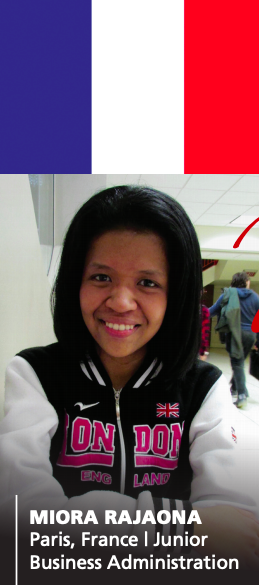
Miora
INTERNATIONAL STUDENT PERSPECTIVE
By Hannah Finnerty | Spring 2016
“Studying in the United States was one of my biggest dreams.”
—Miora Rajaona Junior, Business Administration
How did you decide to study in the US?
In my program we have to study one year abroad. This is mandatory. Afterwards, I chose the United States because I’m really fascinated by the overall culture, it’s history, it’s music. Like Jazz, hip hop, R&B… I got the opportunity to travel around the world, and the United States remains my favorite country because I love the landscapes, I love the people, and I love the overall culture. When I was younger, when I was shy, I used to watch the American TV Shows… When I was younger, I was just like ‘I want to live over there someday.’ Studying in the United States was one of my biggest dreams.
Has the transition to the United States been challenging?
It was not really challenging because of countless reasons. The United States remains a western country, you know. And I think that I would feel really homesick if I would be in China or in Japan or in India, because this is not the same thing at all. That is not the same way of living. That is completely different. But in the US, the transition was not really challenging. Further more, because I travel a lot, I already got the opportunity to speak English with my peers and with other people around me. This becomes a habit. So, this was not really challenging because I don’t have the issues with tongue or with people in general.
Are the courses here difficult?
What is really challenging the very first weeks is when I didn’t understand the teachers, at first. I can understand my peers and roommates, but with the teachers, at first it was a little bit harder to understand them. This was harder because they introduce some concepts that I didn’t know before, sometimes they speak very fast, especially my finance teacher I didn’t understand. And furthermore, in French I didn’t understand finance. In English, this is even worse… Now this is better. I understand everything.
Was it easy to meet people and make friends?
Yes, it is easy to meet people because you got your roommates, your meetings, your organizational life… This makes is easy to meet people. But it is hard to make friends because the conditions are not really efficient to create links, to create bonds, because you cannot see these people everyday. Because we have our own life, our own issues, our own stuff, our own business. So it’s very hard to create strong relationships with people. Yes, you can talk to them, you can hang out with them. You can share great moments with them, but to create very strong relationships, it’s challenging because we live so individually. So it is easy to meet people, but to create strong friendships, it is a little bit more difficult.
Have you ever been uncomfortable as an international student?
Sometimes my friends start a conversation, and they forget that I am here. So they speak very very quick, very fast. I don’t manage to understand anything. I can grab some words, but I cannot grab the entire meaning because they speak very fast. It is very hard to understand them in this case. Maybe I can say that this is the most uncomfortable situation because you have to stay concentrated to grab meaning from what you heard and this is very hard.
What do you think about your abroad experience?
When you live in a foreign country, you meet different people from a different culture and you have a larger vision of the world. . . Everybody that made an exchange abroad told me that it is amazing, incredible, that I’ll have an incredible experience. And I said, “yes, thank you, but I just want to live it, to understand.” This is an unforgettable experience, but I think that words are not enough. We have to live it. You can like your abroad experience. You can not like it. But you have to live it, just to see what studying abroad is all about … I think this is something you have to live just to have another perspective of life.
Advice for students who might be thinking about studying abroad?
Don’t be afraid of being far from your family and friends because it is not as long as you think. I think that my year at BG is going very fast. In two months, this will be almost over and I just want to cry when I think about it, I don’t want to think about it… I think the worst things in life are regrets. The worst is not to hate your exchange; the worst is to not try it.
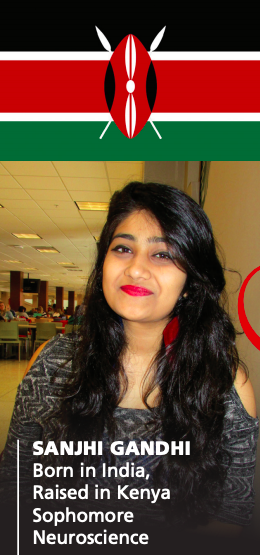
Sanjhi
INTERNATIONAL STUDENT PERSPECTIVE
By Hannah Finnerty | Spring 2016
“When I’m here it’s more about learning the information.”
—Sanjhi Gandhi, Sophomore, Neuroscience
What something you like about Bowling Green?
Something I love about Bowling Green is the community. Everybody is super friendly and welcoming and smiling. Even when I’m just passing by, people always say hi. It’s so sweet. Something I like about the US overall is the freedom and independence that everybody has, that I have here.
What’s something you don’t like?
The food! It’s way different. Everything here has cheese. I think I love cheese but I miss home Indian food. I was really excited the first time I came to the US, I was like, “I get to eat pizzas and burgers everyday!” But now I’m tired of eating pizzas and burgers everyday.
Are the classes in the United States more challenging?
Most of my classes are easier, and I like that. I get to learn a lot more. Back at home it was more about getting the grades and memorizing and I feel like when I’m here it’s more about learning the information. So I like that more, the slower pace.
Has there been a specific class or professor that really helped you?
I loved my GSW 1120 class. I had Amy Rybak. She was wonderful. When I was back home in Kenya, we usually do the British curriculum, so I don’t say ‘trash can’ I say ‘dustbin.’ And we don’t say ‘elevator,’ we say ‘lift.’ So she helped me differentiate between the styles and how when you come to America, there are different ways to write things.
Are you involved around campus?
I’m a campus tour guide, and then I’m also an International Student Ambassador with International Student Services. I’m also the president of the Student Neuroscience Association on campus.
How did you decide to study Neuroscience?
I was actually in between psychology and biology. I wanted to study both, but I didn’t know about neuroscience. But when I looked at schools, a lot of universities had something called, “cognition mind and neuroscience.” I researched more into it and found that I love studying about the brain. One question I always had was how do babies react when they are small, do they understand anything? And why don’t you remember anything from when you’re a baby? I found out that there is a drug in your body, you can take it now that makes you forget everything, so that’s what you have in your body that is produced naturally when you’re a baby. So you don’t remember anything! So it’s things like that that interest me about the human brain and make me want to study neuroscience.
Have you had to adapt to try and feel more comfortable in the states?
One is just to open up. I feel like in the US if you don’t talk, nothing is going to get solved…Also talking like an American is something I’ve had to get used to, like the accent. I’ve had to adapt to that. Sometimes when I say just a few words, people will be like, “what did you say?” so getting used to the accent has been a change.
Are there stereotypes about the US?
The US is just a place where people don’t care about family, where people are very detached and emotionless.
Is that accurate?
I have five roommates and I have gotten to experience all of their interactions with their families. One of my roommates is really close to her family, and their family is perfect. And another roommate does not get along with her family. And I’ve seen that a lot of people are detached from their families, so that’s something I could conclude, but I couldn’t say that for everybody since I haven’t had a personal connection with everybody. That’s what I feel compared to where I am from. I’m very family-oriented, there’s a lot of bonding. I talk to my parents everyday.
Would you recommend the international experience?
Definitely. Any day. It opens up your thought processes and you learn about different cultures… when you’re in one place, you experience the same old life, the same old things. When you go out to the world, there are so many different things that you learn and then you can really grow.

